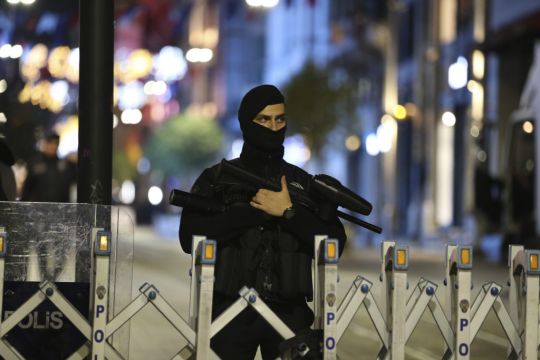Turkish police said on Monday that they have detained a Syrian woman with suspected links to Kurdish militants and that she confessed to planting a bomb that exploded on a bustling pedestrian avenue in Istanbul, killing six people and wounding several dozen others.
Sunday’s explosion occurred on Istiklal Avenue, a popular thoroughfare lined with shops and restaurants that leads to the famous Taksim Square.
“A little while ago, the person who left the bomb was detained by our Istanbul Police Department teams,” Interior Minister Suleyman Soylu announced early on Monday. Police later identified the suspect as Ahlam Albashir, a Syrian national.

At least 46 other people were also detained for questioning, the Istanbul Police Department said in a statement.
Police said the suspect told them during her interrogation that she had been trained as a “special intelligence officer” by the outlawed Kurdistan Workers’ Party, as well as the Syrian Kurdish group the Democratic Union Party and its armed wing.
She entered Turkey illegally through the Syrian border town of Afrin, according to the police statement.
The suspect would have fled to neighbouring Greece if she had not been detained, the interior minister said.
The country was hit by a string of deadly bombings between 2015 and 2017, some by the Islamic State group, others by Kurdish militants who seek increased autonomy or independence.
The minister said the attack would be avenged.
“We know what message those who carried out this action want to give us. We got this message,” Mr Soylu said.
“Don’t worry, we will pay them back heavily in return.”
Mr Soylu also blamed the United States, saying a condolence message from the White House was akin to a “killer being first to show up at a crime scene”.
Turkey has been infuriated by US support to Syrian Kurdish groups.

He said security forces believe that instructions for the attack came from Kobani, the majority Kurdish city in northern Syria that borders Turkey.
In its condolence message, the White House said it strongly condemned the “act of violence” in Istanbul, adding: “We stand shoulder-to-shoulder with our Nato ally (Turkey) in countering terrorism.”
Mr Soylu said of the 81 people who were hospitalised, 50 were discharged. Five of the wounded were receiving emergency care and two of them were in life-threatening condition, he said.
The six who were killed in the blast were members of three families and included a 15-year-old and a nine-year-old.
Istiklal Avenue was reopened to pedestrian traffic at 6 am on Monday after police concluded inspections at the scene. People began leaving carnations at the site of the blast.
Restaurant worker Emrah Aydinoglu said he was talking on the phone when he heard the explosion.
“I looked out of the window and saw people running,” the 22-year-old said. “People were lying on the ground, already visible from the corner of the street (I was in). They were trying to call (for help), whether it was an ambulance or the police. All of them were shrieking and crying.”
The PKK has fought an insurgency in Turkey since 1984, with the conflict responsible for tens of thousands of deaths.







